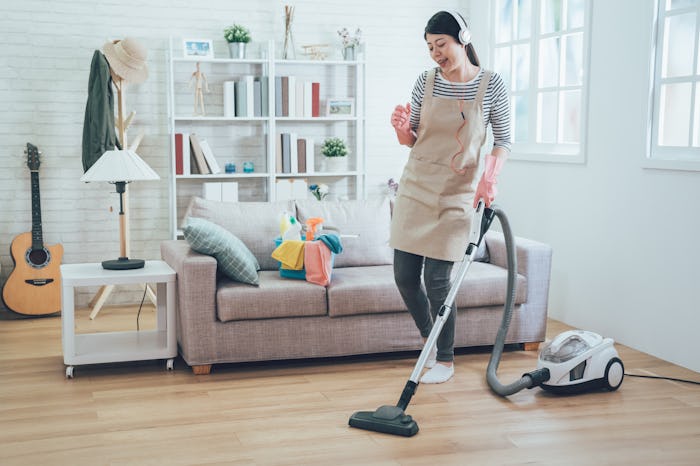Life

If You Still Have These 5 Personality Traits At 30, You'll Prob Have Them Forever
When I was a kid, people who were 30 seemed impossibly "old." The age seemed like a milestone I would take forever to reach. The day I turned 21, a friend of mine joked "Now you're almost 30," and we both laughed and shuddered. But as most "big birthdays" do, my 30th came much more quickly than anticipated. And now that I'm firmly in my mid-30s, I find myself wondering: are there personality traits you can't change after 30?
Most science-based discussions about the personality start with Harvard psychologist William James, whose seminal work The Principles of Psychology laid the foundation for the profession in 1890. In an often-cited line from the book, James wrote: "In most of us, by the age of thirty, the character has set like plaster, and will never soften again." Are we really hard and crusty old humans by the time we hit the big 3-0?
To find out the answer to that question, I connected with Dr. Sanam Hafeez, a neuropsychologist and faculty member at Columbia University in New York City. Psychologists generally use a method called the Five-Factor Model of Personality to evaluate how people are different from each other. "The 'big five,' as it is sometimes called, are five traits used for observing personality traits and the differences between individuals. The five factors include Openness, Conscientiousness, Extraversion, Agreeableness, Neuroticism [OCEAN]," Dr. Hafeez tells Romper.
Our journey toward the adults we are, or will be, is one that includes more twists and turns than you might realize. The traits we sustain throughout the majority of our lives will manifest themselves by the time we mature and reach our third decade. Before then, especially in our teens and twenties, they will "fluctuate before landing into a stable pattern after 30," says Dr. Hafeez. Your personality at 30 will closely resemble the person you'll be at 60. Here are some common characteristics we probably recognize in our lives that will become consistent after we leave our 20s behind.
1Messiness or Neatness
If you're not a neatnik by the time your 20s are over, you might as well get used it. Cleanliness is related to the OCEAN personality of conscientiousness, Dr. Hafeez tells Romper. "By 30, if you are a slob, it would take a really big life event to make you realize you need to clean up after yourself. If you are neat, by 30 when life begins to stabilize you rotate to other people who value organization as much as you do," she says.
2Spontaneity
Openness (or openness to experience) deals with the way we process information, generating creative ideas or new ways of seeing familiar concepts, according to Scientific American. Rather than a cause of upbringing or nurture, like other personality traits, our tendency toward spontaneity, decision-making, and judgment is controlled by the frontal lobe, Dr. Hafeez explains. "We can make the decision to be more dutiful, responsible, or to avoid rushing to judgment," she says, "but that takes practice if our nature runs contrary to that."
3Extraversion or Introversion
We live in a society that is biased toward extroverts, as author and lecturer Susan Cain told The Guardian, which can make it hard for us to value traits commonly associated with introversion (like preferring to be in quiet areas). Even though introverts can fake it til they make it and feign traits that help them advance in an extroverted world, "generally, barring extreme external events, our level of introvertedness or extrovertedness remains consistent," Dr. Hafeez explains.
4Agreeableness
Psychologists consider agreeableness the trait frequently demonstrated by warm, sociable people who get well along with others and who readily seek to resolve conflicts, according to Psychologist World. "People generally score higher on agreeableness with increasing age (they get less aggressive or antagonistic),” University of Texas psychology professor David Buss told The Independent. So if you're a friendly person by age 29, you're less likely to turn into Oscar the Grouch later in life. But if you happen to be a natural grump, age might actually make you more agreeable.
5Neuroticism
Even though in popular culture, being "neurotic" has a negative connotation, as HuffPost reported, psychologists use neuroticism as a clinical term that describes the spectrum of how we may respond negatively to stimulus in our lives. All of us fall somewhere on that spectrum, whether we are a little neurotic or more highly neurotic than others. Paul T. Costa, Jr., a professor of psychology at Johns Hopkins University who has published extensively on neuroticism, explained to The Cut that while neuroticism increases from the ages of 18 to 30, it stabilizes as you become older.
Science might say you're less likely to change certain traits about yourself after 30, but one great that thing comes with crossing over into your 30s is apparently the increased ability to "give less f*cks," like actress Sandra Oh told InStyle, and be more secure in who you are. I find it comforting that we will get to keep the aspects of ourselves we love as we mature.
However, nothing about life after the big 3-0 prevents you from taking charge if you want to change an aspect of your personality. "This means that while our personality is stable after 30, we can be conscious of our traits and apply a different course of action when necessary to navigate life with our loved ones and friends," says Dr. Hafeez. In other words, it might take significant effort to break out of the patterns you're used to after age 30, but you will never be "too old" to try.
This article was originally published on